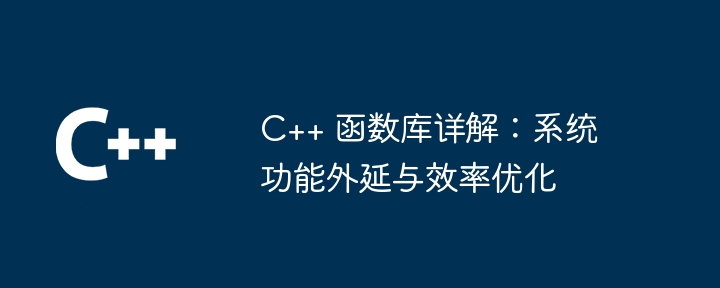 Backend Development
Backend Development
 C++
C++
 Detailed explanation of C++ function library: system function extension and efficiency optimization
Detailed explanation of C++ function library: system function extension and efficiency optimization
Detailed explanation of C++ function library: system function extension and efficiency optimization
May 02, 2024 pm 12:36 PMC function library provides a reusable code collection to expand system functions and optimize efficiency. They cover various functions such as file handling, directory traversal, thread synchronization and time measurement. Functional libraries such as containers, algorithms, data structures, and string operations help improve program efficiency. A practical case shows how to use the function library to extract the maximum and minimum values from a text file.

Detailed explanation of C function library: system function extension and efficiency optimization
Introduction
Function library is a collection of reusable codes in C that encapsulates specific functions and algorithms. They provide a way to easily perform various tasks in an application, thereby increasing development speed and simplifying code.
Extension of system functions
The following are some examples of C function libraries that can help extend system functions:
- File system_error_category( ): Allows manipulation and analysis of file system errors.
- Directory fs::recursive_directory_iterator: Iterator used to access all files and subdirectories in the directory.
- Process this_process::get_id(): Get the ID of the current process.
- Thread std::mutex: Provides a mutex lock to protect shared data.
- Time chrono::system_clock: Allows precise measurement of time intervals.
Efficiency optimization
The function library can also help optimize the efficiency of the application:
- Container vector<int> ;: A dynamic array that can quickly access and modify elements.
- Algorithm std::sort(): Sort data efficiently.
- Data structure unordered_map<string, int>: An associative container based on a hash table to implement fast search and insertion operations.
- String operations std::regex: Provides a general regular expression library to quickly process strings.
- Memory management shared_ptr<int>: Implement reference counting to automatically manage memory and prevent memory leaks.
Practical Case
Let us consider an example using a function library. Suppose we have a text file containing integers separated by spaces. We want to create a program that calculates and prints the largest and smallest integers in a file.
#include <iostream>
#include <fstream>
#include <vector>
#include <algorithm>
int main() {
// 打开文件
std::ifstream file("integers.txt");
// 将文件的内容加载到 vector 中
std::vector<int> numbers;
int number;
while (file >> number) {
numbers.push_back(number);
}
// 使用算法查找最大和最小值
int max = *std::max_element(numbers.begin(), numbers.end());
int min = *std::min_element(numbers.begin(), numbers.end());
// 打印结果
std::cout << "最大值:" << max << std::endl;
std::cout << "最小值:" << min << std::endl;
return 0;
}Conclusion
C libraries are valuable tools for increasing the speed and efficiency of application development. They offer a wide range of functionality, from system functionality extension to efficiency optimization. Understanding and effectively utilizing these libraries is critical to building robust, efficient C applications.
The above is the detailed content of Detailed explanation of C++ function library: system function extension and efficiency optimization. For more information, please follow other related articles on the PHP Chinese website!

Hot Article

Hot tools Tags

Hot Article

Hot Article Tags

Notepad++7.3.1
Easy-to-use and free code editor

SublimeText3 Chinese version
Chinese version, very easy to use

Zend Studio 13.0.1
Powerful PHP integrated development environment

Dreamweaver CS6
Visual web development tools

SublimeText3 Mac version
God-level code editing software (SublimeText3)

Hot Topics
 Concurrency-safe design of data structures in C++ concurrent programming?
Jun 05, 2024 am 11:00 AM
Concurrency-safe design of data structures in C++ concurrent programming?
Jun 05, 2024 am 11:00 AM
Concurrency-safe design of data structures in C++ concurrent programming?
 C++ object layout is aligned with memory to optimize memory usage efficiency
Jun 05, 2024 pm 01:02 PM
C++ object layout is aligned with memory to optimize memory usage efficiency
Jun 05, 2024 pm 01:02 PM
C++ object layout is aligned with memory to optimize memory usage efficiency
 How to implement a custom comparator in C++ STL?
Jun 05, 2024 am 11:50 AM
How to implement a custom comparator in C++ STL?
Jun 05, 2024 am 11:50 AM
How to implement a custom comparator in C++ STL?
 How to implement the Strategy Design Pattern in C++?
Jun 06, 2024 pm 04:16 PM
How to implement the Strategy Design Pattern in C++?
Jun 06, 2024 pm 04:16 PM
How to implement the Strategy Design Pattern in C++?
 Similarities and Differences between Golang and C++
Jun 05, 2024 pm 06:12 PM
Similarities and Differences between Golang and C++
Jun 05, 2024 pm 06:12 PM
Similarities and Differences between Golang and C++
 What are the underlying implementation principles of C++ smart pointers?
Jun 05, 2024 pm 01:17 PM
What are the underlying implementation principles of C++ smart pointers?
Jun 05, 2024 pm 01:17 PM
What are the underlying implementation principles of C++ smart pointers?
 How to implement C++ multi-thread programming based on the Actor model?
Jun 05, 2024 am 11:49 AM
How to implement C++ multi-thread programming based on the Actor model?
Jun 05, 2024 am 11:49 AM
How to implement C++ multi-thread programming based on the Actor model?







